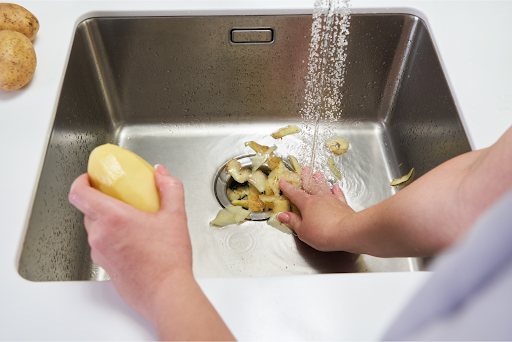Your garbage disposal is one of the most critical appliances in your home. It is responsible for breaking down and removing food scraps. However, many homeowners don’t realize that their garbage disposal is also a key factor in keeping their plumbing system healthy. This blog post will share five simple ways to optimize garbage disposal usage for better plumbing health. Call a professional garbage disposal service in Midlothian if you notice any major issues with your garbage disposal.
-
Use cold water when running your disposal.
This is one of the easiest and most effective ways to properly maintain your garbage disposal. Running cold water while the disposal is on will help solidify any grease or oil in the food waste you’re disposing of. This makes it easier for the disposal to break down the waste and push it through your plumbing system. It also helps to prevent clogs from forming in your pipes.
In addition, allowing the cold water to run for a few seconds before and after operating the unit helps flush out remaining debris. This small step prevents lingering food particles from sticking to the sides of the pipes, reducing odor and bacterial buildup. A quick rinse afterward ensures that everything flows smoothly through your plumbing system without residue being left behind.
-
Avoid putting tough waste down the disposal.
Your garbage disposal is not designed to handle tough or fibrous waste. These items include bones, celery, corn husks, and fruit pits. Putting these items down your garbage disposal can cause it to jam or damage the blades. Instead, throw them away in the trash or compost them.
Items such as pasta, rice, or coffee grounds may also seem harmless, but they can clump together over time, creating dense blockages inside your pipes. It’s always a good habit to double-check what’s going into the sink. When in doubt, dispose of it elsewhere. You’ll be surprised at how much longer your plumbing system can last with these small preventive habits.
-
Clean your disposal regularly.
Over time, your garbage disposal can become clogged with bits of food waste and other debris. This can lead to unpleasant odors and even damage to the blades. To prevent this, clean your disposal regularly by flushing it with cold water and a small amount of dish soap. You can also use vinegar and baking soda to dissolve any buildup.
A good routine is to clean it once a week. Pour half a cup of baking soda down the drain, followed by a cup of vinegar. Let the mixture fizz for a few minutes before rinsing it away with warm water. This natural cleaning method is gentle, chemical-free, and effective at neutralizing odors. For an extra fresh scent, drop a few citrus peels into the unit and run it with cold water. It helps eliminate odor-causing residue and leaves your kitchen smelling pleasant.
-
Use the disposal regularly.
Believe it or not, not using your garbage disposal regularly can be bad for your plumbing system. Food scraps left in your sink can start to rot and emit foul odors. They can also attract pests like flies and rodents. To prevent this, use your garbage disposal regularly to keep your sink clean and fresh.
Frequent use prevents corrosion and keeps the moving parts inside the unit from seizing up. Think of it as keeping the motor well-lubricated — regular operation ensures that the parts remain free of rust and debris. If you often go days without cooking, consider running the disposal briefly with some cold water once or twice a week to keep it functioning smoothly.
-
Don’t overload your disposal.
Your garbage disposal is not meant to handle large amounts of food waste at once. When using your disposal, always feed it small amounts of food at a time. This will allow it to break down the waste properly and prevent it from getting jammed or damaged. Overloading your disposal can also put unnecessary strain on your plumbing system.
To make the process easier, cut large food scraps into smaller pieces before putting them into the drain. This not only ensures smoother operation but also prevents sudden mechanical strain. Additionally, avoid grinding for extended periods — run it for short bursts instead, allowing water to carry the ground-up material away efficiently.
Extra Tips for Long-Term Plumbing Health
In addition to these five core practices, there are several other habits that can help you maintain a cleaner and more efficient kitchen plumbing system. Avoid using harsh chemical cleaners in your sink; they can corrode the metal components and shorten the life of your plumbing. Instead, opt for mild dishwashing liquids or natural cleaning solutions.
Regular inspection of the pipes beneath your sink can also be beneficial. Look for any signs of leakage, rust, or moisture. Early detection of these issues can save you costly repairs down the line. It’s also wise to have a professional plumber inspect your system annually, especially if you live in an older home.
Another simple tip is to be mindful of water temperature after heavy cooking. When rinsing greasy dishes, always start with cold water to prevent fats from melting and sticking inside the drain. Once the grease is flushed away, switch to warm water for normal cleaning. This habit helps maintain better flow and minimizes buildup.
Conclusion
Your garbage disposal may seem like a simple appliance, but it plays a crucial role in the health of your plumbing system. Make sure to call a professional if you notice any issues with your disposal, such as strange noises or clogs that cannot be cleared with simple precautions. Get in touch with the pros now!
If you notice unusual noises, slower draining, or persistent odors, don’t ignore the warning signs. Schedule a check-up with a professional technician to ensure everything is running smoothly. A little attention today can save you from bigger plumbing headaches tomorrow.
Read more: https://idealpost.co.uk/keeping-your-drains-clear-and-your-space-serene/
